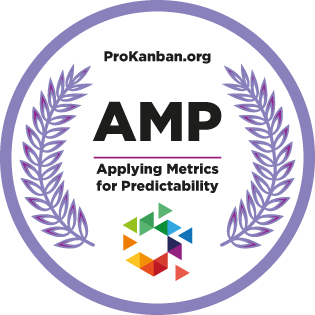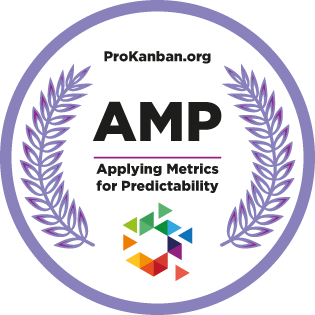TAUGHT BY: Alex Priestley
Applying Metrics for Predictability (AMP)- GUARANTEED TO RUN
Applying Metrics for Predictability (AMP)- GUARANTEED TO RUN
Couldn't load pickup availability
What Are the Benefits of Applying Metrics for Predictability?
Frameworks and Methodologies are a great start. But if you really want to be agile, you'd better learn how to read the road. In the world of knowledge work, metrics and charts are that road. By attending Applying Metrics for Predictability you will:
- Build trust with your stakeholders
- Have more predictable delivery
- Make data-based planning decision without business theatre
- Use data to improve.
“When will it be done?” “How many items will I get in the next release?” “When will all of the items in the backlog be completed?”
These are some of the questions that are most important to your customers. Applying Metrics for Predictability Workshop provides you with the tools you need to answer these questions predictably. In this workshop, attendees will learn which metrics are necessary for accurate forecasting, how to visualise those metrics in appropriate analytics, how to use those analytics to make reliable forecasts and understand risk, and, finally, how to make meaningful interventions for overall process improvement.
Learning Outcomes of Applying Metrics for Predictability
After attending Applying Metrics for Predictability, participants will be able to:
- Describe the purpose of estimating work.
- List the most frequent myths & misunderstandings in Agile metrics and suggest suitable alternatives.
- Explain Little's Law and the relationship between the core Flow Metrics.
- Interpret the most common Flow Metrics Charts.
- Explain why a stable process is necessary for accurate forecasting.
- Describe the concept of right-sizing and why it is important in forecasting complex work.
- Propose actionable experiments to improve the predictability of a work system.
Topics
- Flow Metrics: a deep dive into WIP, Cycle Time, and Throughput—including why you need to track them, how they are related through Little’s Law, and why they are important for forecasting
- Flow Analytics: an introduction to Cumulative Flow Diagrams (CFDs), Scatterplots, Histograms, and other supporting charts—including a detailed discussion of what they are, how to generate them correctly, and how to utilize them for better predictability
- Forecasting Using Monte Carlo Simulation: how to use flow metrics to answer “When will it be done?”—including an introduction to Monte Carlo Simulation and statistical sampling methods for forecasting (no advanced mathematics required!)
- Quantifying Risk and Risk Management: how an understanding of risk is crucial to developing accurate forecasts—including how to quantify risk in the different analytics’ charts and how changing forecast inputs can help to develop an overall risk profile
- How to Get Started: how to immediately apply these techniques to your current project or process to achieve the results you are looking for—including what data to collect, how to mine your data, and how much data you need to begin
Course Brochure
A great way to socialize this course with your peers, co-workers, and managers when exploring different opportunities for professional development and training. A concise overview on the course objectives, topics, and our validated learning approach – this brochure can easily help you explain the return on investment and positive impact that having an AMP course under your belt will bring to both you and your organization! Click HERE to download.
Certification
The Applying Metrics for Predictability (APM) course is associated with the Professional Applied Metrics (PAM) certification by ProKanban.org.
All participants completing the Applying Metrics for Predictability course will receive a password to attempt the Professional Applied Metrics (PAM) assessment. The industry-recognised PAM certification requires a minimum passing score of 85%. If you attempt the PAM assessment within 14 days of receiving the password and do not score at least 85%, you will be granted a second attempt at no additional cost.
Audience
The Applying Metrics for Predictability class is for anyone who wants to provide forecasts on work and help improve systems. Typical attendee roles include:
- Anyone who has been asked to answer “When Will It Be Done?” or otherwise had to give an estimate for a User Story, Epic, Feature, Project, and/or Release
- Executives, managers, or team members who want better understanding and transparency into the health and performance of their process
- Anyone who currently uses Agile or Lean Methodologies and is interested in how to improve the overall predictability and efficiency of their current practices
Summary:
- Duration: 3 x 5-hour live virtual sessions + inter-session work.
- Certification: Professional Applied Metrics (PAM) by ProKanban.org (after passing the exam)
- Languages: English
- Contact: john@orderlydisruption.com
-
What's included:
- Token to take PAM Assessment
- 2 Assessment Preparation calls
- Access to the Orderly Disruption Newsletter
- Invites to exclusive Orderly Disruption Events
About the trainer:
ALEX PRIESTLEY

Alex is a dedicated product manager, leader, coach and organisational agility adviser., specialised in digital product management, digital transformation, agile, scrum, kanban, change and stakeholder management. The best teams he has worked with are those who want to learn and improve. As a Professional Kanban Trainer, Alex is teaching both, private and public classes, to help individuals, teams and organisations to achieve better outcomes.
Favourite Quote: To improve is to change; to be perfect is to change often.
In his free time, Alex is enjoying exploring good food, cooking and travelling – even better when those are combined! He likes to read fiction, biographies, history and political books.
More information about Alex's experience and skills can be found here: https://www.linkedin.com/in/alex-priestley-30340a1a/ .
Alex is joining us in delivering this class during business days. Come to meet Alex and learn great things!
Payment, fees & cancellation
* Payment in advance is required; there are no exceptions. For example, all documentation requirements for invoice payment by the training date must be declared at the outset.
* You may cancel up to the specified online ticketing deadline, and if so, depending on the payment engine/approach, the refund could have deductions for bank transfer fees.
* You may postpone your ticket with a minimum of three business days' notice; thereafter, your lack of attendance at the booked date will be treated as a cancellation with zero refund (due to planning & venue costs for class numbers). Best efforts will be made to fit you into a later workshop. A postponement rescinds your notice period for a refund.
* Electronic manuals and ProKanban.org assessment fees are included. Physical manuals are not provided.
Data protection, data privacy
* Attendees may be asked to optionally consent to receive communications, e.g., follow-up email newsletters.
* In order to get an assessment code from ProKanban.org, the trainer must submit your name and email address to ProKanban.org.
* Attendees will be invited to a community for continued learning.
* It's possible that photograph or video permission will be requested in class for follow-up marketing purposes and social media.
* Reviews, testimonials, and feedback for improvement will be requested Attendees may also be asked to provide feedback to ProKanban.org.
Share

